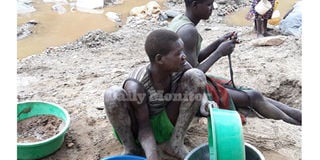Prime
Presidential directive scrapping royalties yet to be implemented

The issue of royalties was a heated topic among miners, some of who supported the ban while others opposed it. PHOTO/FILE.
What you need to know:
- President Museveni in 2017 scrapped paying of royalties on gold on grounds that it would attract foreign direct investment into the sector while limiting smuggling of the precious metal.
The presidential directive of 2017 instructing gold miners to stop paying royalties is yet to be implemented because of bureaucracy in policy making.
Mr David Sebbagala from the Department of Geological Surveys and Mines, speaking during the second annual Uganda Artisanal Small-scale Mining and Quarrying Conference, organised by Africa Centre for Energy and Mineral Policy and Uganda Association of Artisanal and Small-scale Miners, said there is a long process involved before implementing a directive.
“The process is still ongoing and I think the problem has been getting it to Cabinet. It has not yet got Cabinet approval but as soon as it gets one, then the minister will sign a statutory instrument to put that directive into effect,” he said.
President Museveni in 2017 scrapped paying of royalties on gold on grounds that it would attract foreign direct investment into the sector while limiting smuggling of the precious metal.
The issue of royalties was a heated topic among miners, some of who supported the ban while others opposed it.
Mr Emmanuel Kibirige, the Secretary Mubende United Miners Assembly and also a gold miner, says the Presidential directive did not speak to the underlying issues that would emanate from scrapping of royalties. Royalty payments were 5 per cent of the value earned by a miner, of which 80 per cent was remitted to the central government, 10 per cent to local government, 7 per cent to the sub county and 3 per cent to the landowner.
“We do not know whether there is an arrangement where the landowner is paid. We do not know whether there is an arrangement where the district benefits or sub county is paid. As miners, the challenge we get when neither of the above parties benefits, is that they look at us as an enemy and do not support our businesses,” he said noting there must be an arrangement for beneficiaries after scrapping the royalties.
The royalties, the artisanal small scale miners said has been their protection and guarantee to continue operating in the communities.
“Some local governments are not participating or working together with us because they hardly see a direct benefit,” a miner commented.
Local government in the National Development Plan III has been tasked to discover and create new avenues of revenue with the goal of eliminating over reliance on central government which caters for nearly 95 per cent of the former’s budget.
Mr Sebulime Gonzaga, district community development officer, Kasanda district local government says the district is going to impose local service tax on the miners as a means of amassing revenue for operations.
“For us in Kasanda, we stopped lamenting. We are going to document all people involved in mining, we want to get local service tax from them. Each one has to pay. We are going to look at the companies involved in mining, the directors, executive officers to pay local service tax according to local government rates,” he said.
Civil society take
Mr Bwesigye Don Binyina, the executive director, Africa Centre for Energy and Mineral Policy also insisted that the royalty should not be scrapped.
“By their nature, mineral royalties are a compensation to the mineral host country and community for loss of depletable natural resources. Mineral royalties are also neccesary to enable communities address the negative social and environmental externalities associated with mineral exploitation.
It was therefore wrong for the President to unilaterally remove mineral royalties without consultations with local Governments and mineral rich host communities as beneficiaries,” he said.
However, Namayingo district local government revealed that it had not received royalties from ministry of energy for over 5 years even before the presidential directive of scrapping the tax.According to the auditor general’s report 2018-19, some districts had not received royalties from ministry of energy for instance, Wakiso, Kapchorwa.
The miners urged ministry of energy to publish remittance of royalties on different platforms for transparency of the entire process.




